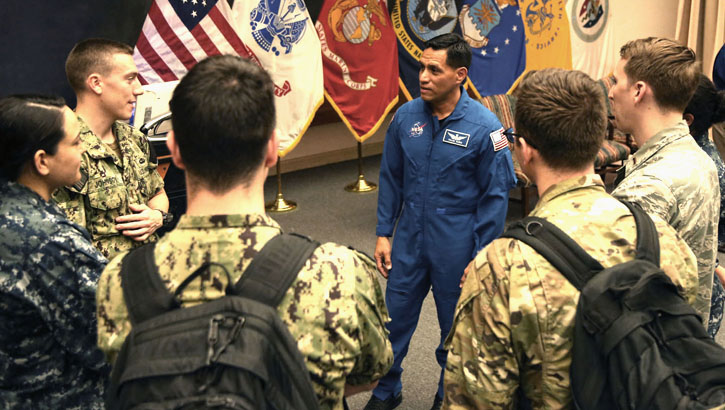
Rocket man: USU grad heading to International Space Station

Army Maj. Frank Rubio is surrounded by Uniformed Services University students with additional questions after a panel discussion about opportunities to work with and for NASA. (Photo courtesy of USU)
An Army officer who's a graduate of Uniformed Services University of the Health Sciences is among the three-person crew scheduled to launch on the spacecraft Soyuz 59S July 20 to live and work on the International Space Station, or ISS. Army Col. Andrew Morgan was an emergency physician in the Military Health System serving in special operations units worldwide before being selected by NASA in 2013 as an astronaut candidate. He will serve as a flight engineer for the ISS expeditions 60 and 61. His anticipated adventure sparked a recent panel discussion at USU about opportunities for alumni and students to work with and for NASA.
Astronaut training is "a lot like med school," said Army Maj. Frank Rubio, a physician who's spent the past 18 months preparing to one day go into space. "For every one or two hours of fun, there's about 10 to 20 hours of studying."
The training is academically rigorous, he added, and "sometimes, you're scared out of your mind."
Rubio was one of four panelists who spoke during the discussion, which was part of the President's Leadership Series. It was titled "In Support of Space Flight: The Countdown to the International Space Station Expedition 60/61 Launch."
The other panelists were Dr. Mark Mavity, director of NASA's Health and Medical Systems Division in Washington, D.C.; Dr. Richard Scheuring, associate professor of military and emergency medicine at USU, and a medical operations flight surgeon at Johnson Space Center in Houston, Texas; and Air Force Lt. Col. Kristin Silvia, chief of bioastronautics at Patrick Air Force Base, Florida. All the panelists but Scheuring are also USU graduates.
Space, like the military, "is a team sport," said Scheuring, who's also a flight surgeon in the U.S. Army Reserve and will be supporting Morgan's expedition from the Johnson Space Center. Scheuring urged students interested in internship opportunities to get in touch with him because their USU education makes them attractive candidates for the space agency.
"When I tell other people what we do here, their mind is blown," Scheuring said, noting in particular Operation Bushmaster. The simulated mass casualty exercise is required of all fourth-year medical students as well as some graduate school of nursing students.
Mavity urged the students to take advantage of leadership opportunities. "You’re here to support the … women and men who support the mission in harm's way," he said. "You’re also here to become leaders."
Silvia described her role in Human Space Flight Support at Patrick Air Force Base as "teaching prehospital care and then space medicine on top of that." She said her background in emergency medicine makes her particularly well-suited for the position.
"There's no one right formula to become an astronaut," Rubio said, adding that a career in space "was not on my radar. My lifelong dream was to be a doctor." Rubio was a battalion surgeon for the 10th Special Forces Group before a friend suggested he apply to NASA.
When Rubio completes training next month, he'll be assigned technical duties at the Johnson Space Center while awaiting a flight assignment. "Leaving medicine was a high price to pay for joining NASA," he said. "It hurts to let that go." However, he said he wears the NASA uniform with great pride.
The final question asked the panelists about their favorite space-related movie. Mavity named the The Right Stuff, the 1983 film about the original Mercury 7 astronauts. Scheuring said the Star Wars franchise films, and Silvia said Hidden Figures, the 2016 film about African-American female mathematicians who worked at NASA in the early '60s. Rubio said he'd choose the 2015 film The Martian,about an astronaut accidentally left behind, mainly because his children love it.
Navy Cmdr. Tammy Servies, associate program director for USU's general preventive medicine residency, served as panel moderator. Servies is a physician and a USU graduate.





















.png)












No hay comentarios:
Publicar un comentario